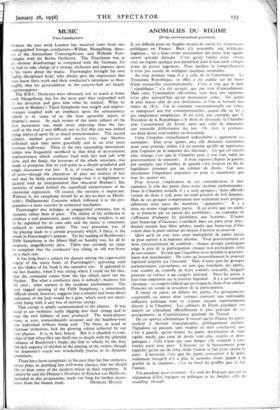MUSIC Two Conductors
DuiuNG the past week-London has received visits from two distinguished foreign conductors—Willem Mengelberg, direc-
tor of the Amsterdam Concertgebouw, and Wilhelm Furt-
wangler with his Berlin Orchestra. The Dutchman was at an obvious disadvantage as compared with the German, for he had to take charge of a strange orchestra and impress upon
it his views about the music. Furtwangler brought his own highly disciplined body, who always give the impression that they know their work and their conductor's intentions so thor- oughly that his gesticulations in the concert-hall are largely supererogatory.
The B.B.C. Orchestra were obviously not so much at home with Mengelberg, but for the most part they responded well to his direction and gave him what he wanted. What he wanted in Brahms's Third Symphony was weight and impres- siveness - coupled with an emphasis upon the sensuousness which is - to some of us the least agreeable aspect of Brahms's music. So each return of the main subject of the first movement was made more imposing than the last, until at the end it was difficult not to feel that one was indeed
being imposed upon by so much portentousness. The second subject, marked grazioso and mezza voce, was likewise
delivered each time more gracefully and in an ever more luscious half-voice. Then in the two succeeding movements tempo was frequently sacrificed to that kind of meretricious expressiveness which confuses loud with fast and soft with slow, and the finale, the keystone of the whole structure, was made so pompous that its real point as a deeply-pondered and
tragic denouement was lost. It is, of course, mainly a matter
of taste—though the alterations of pace are matters of fact and may be fairly pronounced wrong—but it is legitimate to quarrel with an interpretation that obscured Brahms's fine austerity of mind behind the superficial attractiveness of his emotional expression. Of course, the emotion is important.
Without it, his symphony would be as dry-as-dust as Hinde- mith's Philharmonic Concerto which followed it in the pro- gramme—a mere exercise in orchestral mechanics.
Furtm angler also indulges in exaggerated contrasts, but of dynamic rather than of pace. The ability of his orchestra to produce a real pianissimo, quiet without being toneless, is apt to be exploited for its own sake and the music is sometimes reduced to vanishing point. The very precision, too, of the playing leads to a certain preciosity which, I fancy, is the chink in Furtwangler's armour. Yet his reading of Beethoven's Fifth Symphony at the Albert Hall on Sunday was, for all its
neatness, magnificently alive. There was certainly no cause to complain that the conductotWas riding an old war-horse on a slack rein.
It has long been a subject for dispute among the cognoscenti which of the many beats of Furtwangler's quivering stick or the shakes of his head is the operative one. It appeared to rrie last Sunday, when I was sitting where I could see his face,
that the command comes from the lips which snort out the rhythm., But what a conductor does is nobody's business but his own ; what matters is the resultant performance. The very ragged opening of the Fifth Symphony, a notoriously difficult attack, however, suggests that a simpler and more direct indication of the beat would be a gain, which need not neces- sarily bring with it any loss of nervous energy.
That energy is amply communicated to the players. It was good to see violinists really digging into their strings and to hear the 'rich fullness of tone produced. The wind-players were, as ever, extraordinarily accurate and the hautboy-tone was individual without being acid. The brass, as usual in German orchestras, lack the glowing colour achieved by our best players. It is, in fact, brassy. But it is churlish to com- plain of that when they can thrill one so deeply with the splendid
radiance of Beethoven's finale, the link to which, by the way, did lack urgency of rhythm in the playing of the violins, though the drummer's touch was wonderfully precise in its dynamic gradations.
There have been complaints in the past that this fine orchestra never plays us anything but well-worn classics, that we should
like to hear some of the modern music in their repertory. It cannot be said the Pfitzner's Overture to kitchen von Heilbronn, included in this programme, made one long for further depar-


















































 Previous page
Previous page